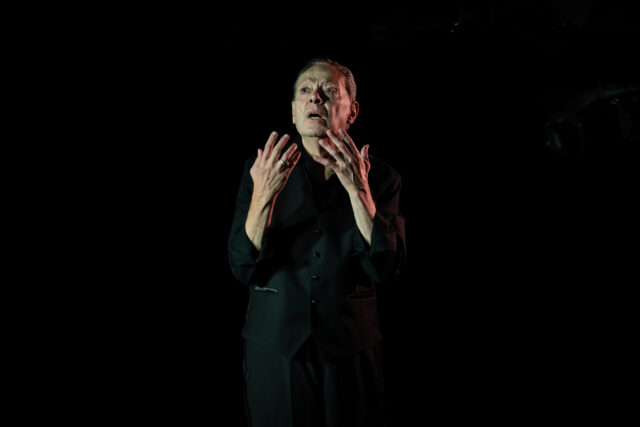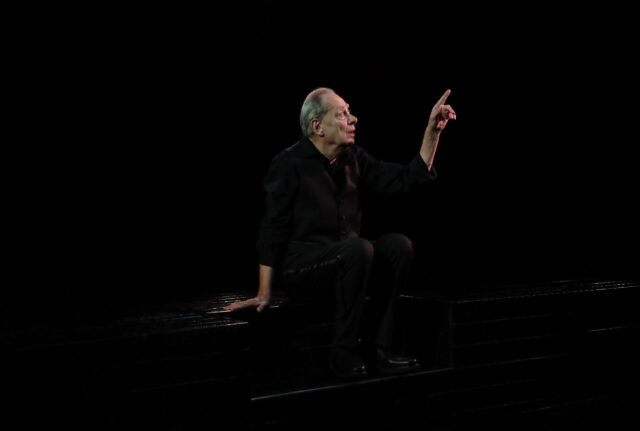
Edgar Oliver returns to his early days at the Pyramid Club in Rip Tide (photo by Regina Betancourt)
RIP TIDE
Axis Theatre Company
One Sheridan Sq. between West Fourth & Washington Sts.
Wednesday – Saturday through October 28, $10-$40, 8:00
866-811-4111
www.axiscompany.org
Master storyteller Edgar Oliver returns to the beginning of his oratory skills in Rip Tide, the latest of his deeply personal solo shows to be presented by Axis Theatre Company, directed by Randall Sharp.
In such previous Axis works as In the Park, East 10th Street, and Attorney Street, in addition to Helen and Edgar and London Paris, Edgar explores key moments from his past, from his upbringing in Savannah, Georgia, to his move to New York City with his sister, painter Helen Oliver Adelson, and his development as a beloved downtown playwright, poet, and raconteur.
Rip Tide begins humbly enough. “I want to tell you something that happened to me. When it happened it was so simple and unexpected — so simple yet so magical — I almost didn’t realize it was happening,” he says at the start. Dressed in all black, he walks across a black platform with a step on two sides, where he sometimes takes a seat or meanders onto the main floor. He moves slowly, using his hands to express himself with unusual motions, and speaks in his trademark tone: affected yet elegant and luxurious, enchantingly otherworldly, part Shakespeare thespian, part late-night horror-film host; you’ll be entranced just by the way he pronounces “ar.”
What happened was that Edgar and Helen had been swept past the velvet rope and into the Pyramid Club, the hot nightspot for alternative performers (John Kelly, Penny Arcade, Kembra Pfahler), drag queens (RuPaul, Lady Bunny), punk bands (Butthole Surfers, Flaming Lips), and cultural icons (Andy Warhol, Debbie Harry) that opened in 1979 at 101 Ave. A between Sixth and Seventh Sts. Oliver was twenty-three and Helen twenty-four, on the brink of their artistic careers and bohemian lifestyle.
“The Pyramid became our world. We realized there were others like us,” he says. “There was a world of drag queens and lost souls sitting on the lip of a stage in the back of an old bar full of lunatics at night on Ave. A.”

Edgar Oliver shares deeply intimate stories in latest monologue at Axis (photo by Regina Betancourt)
Oliver was shocked when Pyramid cofounder Bobby Bradley asked him to perform, something Edgar had never done before. But he immediately says “OK!” — a running gag in the play is how quickly Edgar agrees to just about anything — and performs his poem “Rip Tide” onstage, accompanied by two dancers and music from Nino Rota’s score for Fellini’s La Dolce Vita. “The disgorged jaws of petrified sharks are / yanked up by rip tides / from the smooth graveyard forever below ebb / and harry the coast,” Oliver remembers, with Rota’s music played live by Paul Carbonara on guitar, Samuel Quiggins on cello, and Yonatan Gutfeld on piano. Sitting in a far corner, the trio also plays original music throughout the show.
Soon Oliver is performing regularly at the Pyramid, including a horror play called Motel Blue 19, part of which he acts out. He introduces us to Brian Butterick, aka Hattie Hathaway, who ran the Pyramid after Bradley disappeared, and Brian Damage, an artist and designer who made a wild costume for Oliver to wear in the Final Fashion Solution contest and was working on a large painting titled Dreamland Burns when he died, a canvas about the fire that destroyed Coney Island in 1911 and serves as a metaphor for Oliver’s memories, particularly of the AIDS crisis, which was just breaking out.
Despite some verbal repetition, Rip Tide is another gripping monologue from the eccentric Oliver. Carbonara’s sound design and David Zeffren’s lighting give the show a haunted quality, which fits not only with this specific story but with Oliver’s life; per previous tales, his mother might have been a witch, and at one point he was the only person left living in his building in the East Village. Sharp, who has directed numerous Oliver shows and cast him as an erudite oddball in Worlds Fair Inn, expertly gets the most out of the sparse, dark proceedings, eschewing pure nostalgia in favor of a pervasive gothic eeriness.
The narrative focuses not only on the creation of art but on innocence and loneliness. Oliver shares two potential sexual encounters with men that are absolutely heart-wrenching. “I felt I was a failure as a gay person. . . . I just thought my destiny was to be solitary,” he admits with more than a touch of shame.
“I think I set out onstage to explain the beauty and sorrow of my solitude,” he says just past the halfway mark. “And even if I was unable to do that back then — I hope that somehow I will be able to do that now. I guess that’s what I’m trying to do in this show.”
Mission accomplished, And that’s nothing to be ashamed of.
[Mark Rifkin is a Brooklyn-born, Manhattan-based writer and editor; you can follow him on Substack here.]